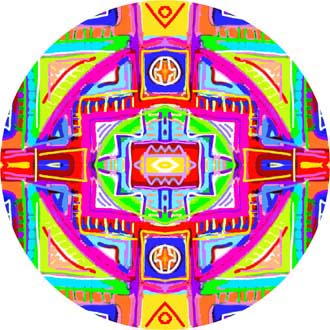

Intuition and Happiness
By
Janette Kaye Cothrel*, Atlantic University
As a professional intuitive counselor, I have observed in my practice the relationship between intuition and happiness, but I never put enough concentrated thought into it to crystallize that relationship into words. Then recently, a good friend of mine recommended I take a look at the book Happy for No Reason by Marci Shimoff with Carol Kline. At the time I had no apparent reason to run to the library, but something in my friend's voice rang a chord in me and I decided to make time to check out the book.
What I discovered in reading Shimoff is the evidence she lays out for what makes people inherently happy is remarkably similar to the skills one develops and improves when working on or enhancing one's own intuition. It seems the development of intuition and the search for happiness can essentially be interchangeable. By seeking out true happiness, one must utilize intuition, and by embracing intuition, happiness can be achieved.
In Happy for No Reason Shimoff's subchapters read like a primer on intuition development. The titles alone speak volumes: "Make Peace with Yourself," "Question Your Thoughts," "Focus on Gratitude," "Tune into Your Body's Wisdom," "Listen to Your Inner Voice," "Find Your Passion," and "See the World as Your Family" are just a few of the insightful titles. There is clearly a remarkable parallel between the skills developed in intuition and in those used or developed in becoming happy.
Whether in training to recognize our own intuition or in obtaining intuitive readings from a professional, all roads seem to lead to a desire to become happier. Certainly, it would seem that we are meant to be happy and in fact are re-invited to discover that state throughout our lives. I know my own courtship with my Intuitive Self has enhanced my happiness immensely. Through sharing this knowledge, I have enabled others to tap into a new sense of awareness, and help them discover this innate ability within themselves.
At the request of a friend, I decided to offer and teach a course on developing intuition. This friend was in one of the intuition development groups I run, and she wanted to be able to share what she had learned and the benefits she had felt by having me offer instruction to her friends and colleagues. I also needed to do a "culminating project" for my Master's degree at Atlantic University, and decided that doing an intuition training program would be a perfect project for me, as it would give me a chance to share my experiences of intuition and happiness. You can read about my class, Intuition Development: An Introductory Course for Awareness and Understanding of Working Intuition, by following the link. I welcome your comments.
I understood why she was so excited about sharing her experiences, having come myself to an appreciation of the self-knowledge, sense of homecoming, and increase in happiness associated with intuition development. Perhaps intuition is not an odd commodity experienced randomly, but is rather a compass that points to a better way of living and a gift to be enjoyed by all.
From working with others, I know first-hand that intuition is a skill like any other that can be practiced and improved upon, and that often what appears most complicated is really rather simple. I have also noticed that many of the people I work with report feeling happier as a result of honoring and improving their intuition. So if you find yourself in the search for happiness, you might just stumble across your Intuitive Self; perhaps it could even happen the other way around.
* Janette may be contacted at JanetteKaye@ymail.com